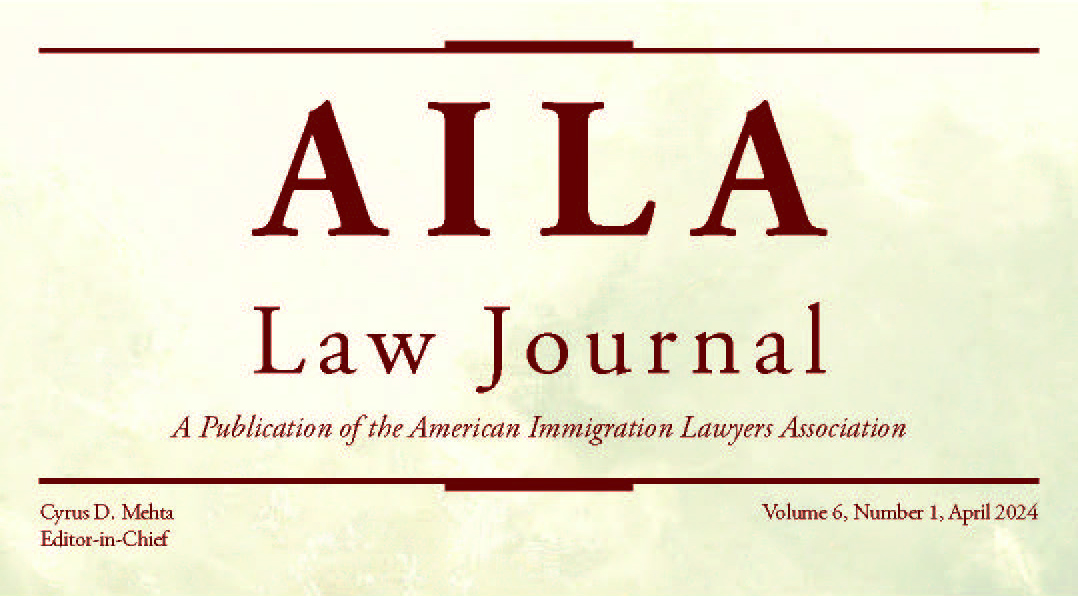Think Immigration: The Next Best Thing to Attending the AILA Law Journal Symposium Is Reading This Issue

Earlier this spring, I was delighted to be a part of the AILA Law Journal’s first symposium, titled “Shaping Immigration Policy Through the Federal Courts,” on March 21, 2024, in Washington, D.C. A unique gathering of immigration law colleagues, both academic and practicing, the symposium was an outstanding opportunity for conversation.
But, what if you weren’t able to be there?
Fortunately, our Editorial Board had pondered this exact conundrum since the idea of a symposium first emerged and I’m delighted to share that this issue of the AILA Law Journal is designed to give anyone an inside look into our robust dialogue. In particular, we discussed how the federal courts have become ever more crucial to the practice of immigration law as Congress remains unable to pass necessary reforms and presidential action is litigated.
Here is a quick rundown of the pieces in the issue. Some are lightly edited transcripts of the symposium sessions, while others are original written works built upon the symposium’s main topic:
- My letter as Editor-in-Chief is based on my introductory remarks on how Texas’s lawsuit challenging President Biden’s widely successful humanitarian parole program for Cuba, Nicaragua, Haiti and Venezuela was dismissed for lack of standing,
- The first transcript is from the symposium panel “Creating Pathways for STEM Workers Through Non-Legislative Means,” which featured editorial board members William Stock and Diane Rish, along with Amy M. Nice (Distinguished Immigration Fellow and Visiting Scholar, Cornell Law School) and Simon Nakajima (Assistant Director for STEM Immigration, White House Office of Science and Technology). This topic is exceptionally timely given the demands of the U.S. labor market, and it was helpful to hear insights into how the provisions in the Immigration and Nationality Act could buffer non-legislative means to attract and retain STEM talent.
- The second transcript gives readers a window into another panel. “DACA Litigation and the Opportunity for All Campaign” featured Kaitlyn Box (editorial board member), Ahilan T. Arulanantham (UCLA Law School), and Anil Kalhan (Drexel University). I encourage you to read the lively discussion on the DACA litigation, which also included a discussion of the ability of states to employ undocumented persons.
- The third panel, titled “The Role of Federal Courts in Shaping Asylum Law: A Comparative Analysis,” featured Dree Collopy (author of AILA’s Asylum Primer), along with editorial board member Rebecca Sharpless and Sabrineh Ardalan (Clinical Professor of Law, Harvard Law School). While the transcript for this panel is not included in this issue, the article for this panel, authored by Zack Albun and Sabrineh Ardalan, provides an engaging read.
We have also provided pieces related to distinct topics presented at the symposium, such as “Correcting Course on Matter of Lozada Through the Federal Courts” in which Sui Chung, Sarah Owings, Susan Roy, and Rekha Sharma-Crawford challenge the requirement to file a bar complaint against immigration practitioners to demonstrate ineffective assistance of counsel under Matter of Lozada (this is a crucial issue and I urge readers to read through this blog post from earlier this year sharing the Ethics Committee’s report on the topic.)
Next, “’Circumvention of Lawful Pathways’ or Circumvention of the Law? A Comparison Across Party Lines” by Jenna Ebersbacher gives food for thought as President Biden’s rule has created opposition on both sides of the aisle. And Jean Binkovitz and Eric Eisner offer insights into the “Legislative History of the APA as a Tool to Minimize Government Use of the Foreign Affairs Function Exception,” which extrapolates upon the past to predict the future.
Finally, we include two papers that, while not presented at the symposium, are deeply related to the key themes of the issue. First, “Can the Law Still Protect Access to Asylum? A Comparative Look at the Fight to Preserve Access to Asylum in the United States and the United Kingdom” by Susan M. Akram and “Shaping Immigration Policy Through Federal Courts” by the indomitable Robert Pauw, author of AILA’s Litigating Immigration Cases in Federal Court. Both are must-reads for the immigration law community.
I so appreciated the chance to learn about and think through these important concerns at the symposium, and thank Managing Editor Danielle Polen, the Editorial Board and the AILA National staff for their hard work in successfully pulling off the first-ever symposium. I hope that offering our readers this chance to “be in the room where it happened” is both meaningful and informative as you consider immigration law as a practitioner, reporter, or interested lay person.
AILA members, your FREE digital copy of the AILA Law Journal is available on this page, along with past issues.
